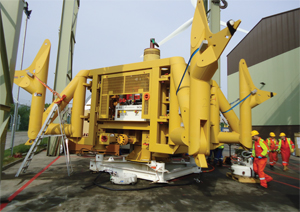A recent Jones Act ruling by U.S. Customs and Border Protection (CBP) holds the promise of generating more work for U.S.-flagged vessels in Gulf of Mexico oil fields, but it also contains “potential loopholes” that could mitigate the gains, according to industry officials.
For decades, foreign-flagged dive boats, work barges and other vessels have serviced oil installations off the U.S. Gulf Coast, often with gear loaded at American ports. That activity could decline this year, however, due to CBP’s new interpretation of what constitutes “merchandise” and “vessel equipment.”
While the Jones Act limits the transportation of merchandise between domestic coastwise points to U.S.-flagged vessels, CBP has for decades defined certain items used in oil and gas operations as vessel equipment that is not subject to the restrictions. The distinction is important to offshore operators, as foreign vessels are typically less expensive to hire than U.S.-flagged vessels.
But in a ruling finalized on Dec. 11, CBP narrowed its definition of vessel equipment to items that are “necessary and appropriate for the navigation, operation or maintenance of a vessel, and for the comfort and safety of the persons on board.” The agency also loosened restrictions on lifting operations, however, likely opening the door for further use of foreign-flagged vessels in this area. The ruling took effect Feb. 17.
The devil might be in the details, but David Reisman, a maritime attorney with the Louisiana-based law firm Liskow & Lewis, said the new vessel equipment definition “will have a significant impact on the ability to use foreign-flagged vessels and should increase the usage, and therefore value, of U.S.-flagged vessels.”
“On behalf of the 650,000 Americans whose jobs are supported by the Jones Act, we applaud the long-awaited action by (CBP) to repeal prior letter rulings that unlawfully permitted foreign vessels and crews to take the work of American mariners,” American Maritime Partnership (AMP) President Michael Roberts told Professional Mariner.
But Roberts noted that parts of the ruling could be construed to allow the use of more foreign-flagged vessels, a concern echoed by Aaron Smith, president and chief executive officer of the Offshore Marine Service Association (OMSA).
Smith said CBP “has decided to put America second by creating potential loopholes for foreign vessels and crews to unlawfully operate in American waters and take the jobs of American vessels and workers.”
Speaking about the potential loopholes, Reisman said CBP has not addressed its distinction between “unlading” and “paying out” pipe or cable. The practice of paying out typically involves rolling an object off the back of a moving vessel.
“What (CBP) has historically held is that (it is not unlading) at a specific point, that’s paying it out, and that’s the distinction they draw to say that’s not a coastwise activity,” Reisman said.
In regard to lifting operations at offshore installations, CBP’s ruling raised concerns among Jones Act opponents and advocates alike. Any man-made object attached to the U.S. Outer Continental Shelf is considered a coastwise point.
“If CBP redefined vessel equipment without the corresponding changes to lifting, the offshore oil and natural gas industry would be significantly hindered … due to the lack of coastwise-qualified vessels,” said Holly Hopkins, senior policy adviser at the American Petroleum Institute.
She said long-standing Jones Act interpretations have permitted foreign-flagged vessels to carry out installation activities. While more offshore platforms are currently being removed than installed, Reisman said lifting is needed for both activities.
Under previous interpretations, a foreign-flagged vessel could not move laterally during a lifting operation.
“Now, you can go offshore with a foreign derrick barge, hook up to a platform, pick it up and bring it into port. You can have lateral movement and place it on something else,” Reisman said.
While enforcement of the Jones Act has changed, Smith and Roberts both noted that only Congress has the power to amend it. More than 50 members of Congress signed a letter opposing CBP’s Dec. 11 ruling.
Reisman said the issue of which vessels can service offshore installations would come up again as the burgeoning offshore wind industry develops.
“Ultimately, the test will be the decisions CBP makes on specific letter-ruling cases in the future, and AMP will carefully monitor those,” Roberts said.

